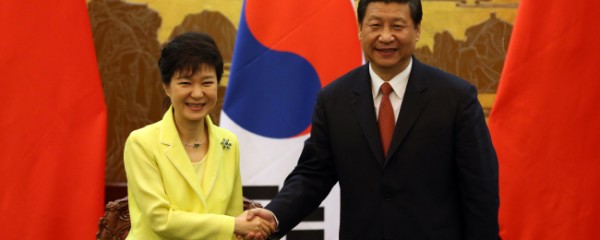21
Jul 2014
Beijing and Seoul new trade agreement
Chinese and South Korean leaders have pledged to sign a bilateral trade agreement between China and South Korea by the end of this year and introduce direct trading of their currencies to spur cross-border renminbi transactions and deepen economic ties in two of Asia’s largest economies. The agreement was made between Chinese President Xi Jinping and his Korean counterpart Park Geun-hye on his first visit to Seoul. “Through these measures, exchange between companies and citizens in the two countries will become faster and more free,” Ms Park said in a joint press conference.
South Korea also received a Rmb80bn ($12.8bn) quota to invest in Chinese capital markets, the same amount as the UK and France recently received, and compares with Rmb50bn for Singapore and Rmb270bn for Hong Kong. A renminbi clearing bank will be set up in the Korean capital to facilitate the wider use of the renminbi for trading and infrastructure will be set up in Shanghai for direct renminbi-won trading.
Mr Xi is the first Chinese leader to choose to visit Seoul before making a trip to Pyongyang, its only treaty ally, reflecting the increasing importance of South Korea to China as an economic partner. He was accompanied by 250 business executives including Jack Ma, founder of ecommerce group Alibaba, and Robin Li, chairman of search engine Baidu.
The two leaders are stepping up efforts to conclude a trade deal as bilateral trade between the two countries expands, reaching $274bn last year. China has been South Korea’s biggest trading partner since 2004, taking in about a quarter of Seoul’s exports. The push also comes as the US, Japan and 10 other countries step up their efforts to conclude the proposed 12-nation Trans-Pacific Partnership. Chief negotiators were gathered in Canada for another round of negotiations and US President Barack Obama and other TPP leaders said they want to conclude a deal before November’s summit of the Asia-Pacific Economic Cooperation countries. Neither China nor South Korea are included in the TPP talks, although South Korea is expected by many to be invited to join once a deal is concluded among the initial 12.
The TPP negotiations have also gained a geopolitical tone, with officials in Washington referring to them as the “economic backbone” of a US “pivot” to Asia, making China both uneasy and eager to find its own ways to respond. The moves to strike a deal with Seoul are one sign of that, as are China’s recent efforts to revive discussions about creating a much broader Asia-Pacific free trade area in which both it and the US would take part.
China is also promoting greater use of the renminbi abroad in a slow process towards eventually rivalling the US dollar in international trade and financial transactions. The deal between China and South Korea is a step towards this. Kwon Goo-hoon, an economist for Goldman Sachs, said in a recent report that it may also help ease the upward pressure on the won against the US dollar, with the Korean currency appreciating more than 5 per cent against the dollar to hit a six-year high in the second quarter.































